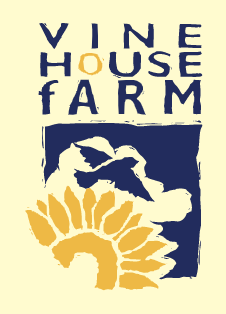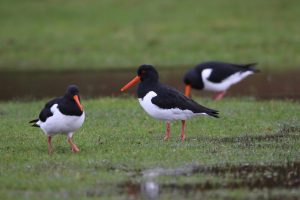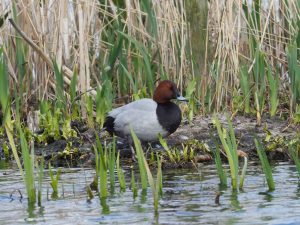
Surprisingly this August was slightly warmer than the average for the last 50 years, which was 16.8°C. When comparing the average temperature of 17.3°C over the last 20 years, it was colder than normal as August’s average was 17.1°C. It was also drier than normal with 46mm of rain against our average of 53mm; August is usually our wettest month of the year, here at Deeping St Nicholas.

What looked like being a very wet harvest thankfully didn’t materialise and most of our wheat was harvested in good conditions. However, the wet July has produced more straw and less grain than usual; yields are down on recent harvests.
On August 20th, our combine caught fire. One of the men in the field saw fire coming out of the back of the combine, so he phoned the driver to tell him at the same time the driver saw flames too. The fire spread so fast he only just had time to stop the machine, gather his belongings and make a quick exit. In the next few seconds the whole machine was on fire, which was very frightening. An acre of wheat and 10 acres of stubble were burnt. Two fire engines soon arrived and were able to stop the fire from spreading across our fields, but the combine was a complete write-off. However, the combine was insured and the insurance covered the hire of another combine for the rest of the season. A neighbour came and helped us the next day, and Robert was able to hire a combine the day after. All wheat, peas and beans are now safely gathered in. That just leaves the canary seed, red millet, white millet and the sunflowers to harvest with the combine.
The wet July should have suited the sugar beet and the potatoes. We have not made any money out of either of those crops for a few years. So why do we continue to grow them? Both crops have been valuable throughout my life and we have the specialised machinery for both crops. There does come a time though for some farmers to say ‘enough is enough’, and will stop growing potatoes, sugar beet, vegetables or even milking cows. A few farmers have already done this, leaving these intensive crops in fewer and fewer hands. British Sugar have increased the price of sugar beet by 80% this year. They needed to otherwise we, and many other growers, would not have grown any. Several farmers have stopped growing potatoes because they have not made any money out of them. Less acres of potatoes should mean a higher price, but we will have to wait and see.
Last month I wrote about three of our men grading and dispatching 1,000 tonnes of potatoes in five days, when 60 years ago it would have taken five men 75 days to do the job. I was talking to a visitor in our Café last week and he was saying I was being optimistic about five men being able to grade and load 15 tonnes a day in May and June. He thought 10 tonnes would have been all five men would be able to grade, bag and load in a day so that means it would have taken five men 100 days to do what it took our three men five days to do!


Wood Pigeons are dominating the Vine House Farm garden mainly because we have such good drinking facilities. They are also still breeding and building nests, some are sitting on eggs and others rearing young. To rear young they need a supply of grain and a supply of water. Every bird has to take its young moist food as it cannot take them water and that moist food for most species is insects.
Autumn is usually quite a dry time of year and pigeons are eating dry grain, so they also need to drink. Those that are still breeding will need water to turn the dry grain into pigeon milk which is then regurgitated to their youngsters. They only lay two eggs because their digestive system will only work fast enough to feed one chick, two adults and so two chicks. By late October, they will be flocking up in the fields and woods, talking to their friends and exchanging ideas of where to go for next Summer’s breeding season. Which garden eh?!
All the Blackbirds and finches have departed, just the Tit family calling in to the Vine House Farm garden for food. The Blackbirds have finished breeding and you could say they have gone on holiday – they have gone to a resort where there is plenty of food, in hedges or bushes where there are plenty of berries. They rest up in the bushes away from Sparrowhawks, only coming to the outside of the bushes to get a quick feed. They keep out of sight because they are moulting their wing feathers which takes about a month, so they cannot fly so fast as usual. The Sparrowhawk just moults one wing feather from each side at a time, so he can always fly as fast as normal.
The Finches have just finished breeding and they will be flocking up with other finches and feeding where there is plenty of food. They will also be moulting, but will take a bit longer than the Blackbirds. When confronted by a Sparrowhawk, the flock will fly up in the sky weaving about, which confuses their attacker and so he is not so successful with them.
By the end of August insects are in their last stage of life – the flying stage. They are then adults and will lay eggs which will hatch in Spring next year. Swallows and House Martins are still breeding because they feed their young on the flying insects. Most of the Swallows in Deeping Fen have had two broods and have now left their breeding sites.
Our Turtle Doves have been released and have been seen around the district. It could be that, having been in captivity for a year, some of them might not migrate. It was always the thoughts of Bill Makin, the founder of the Turtle Dove Trust, that some of them might not migrate and indeed he had two feeding in his garden all winter, the year before he died. His aim was to get more Turtle Doves into the English countryside.
Our man in Suffolk, Trevor Ley has reared another 500 this Summer and in early October, they will be brought to the Norfolk and Lincolnshire pens for release next Spring. We appreciate all donations for the Turtle Dove Trust, if you’d like to support this project.
The next two months are not very ‘birdy’ here. Our summer visitors will have all gone and our resident birds are lying low because they are moulting. It is therefore a time to do some work on their habitat, here on the farm.



